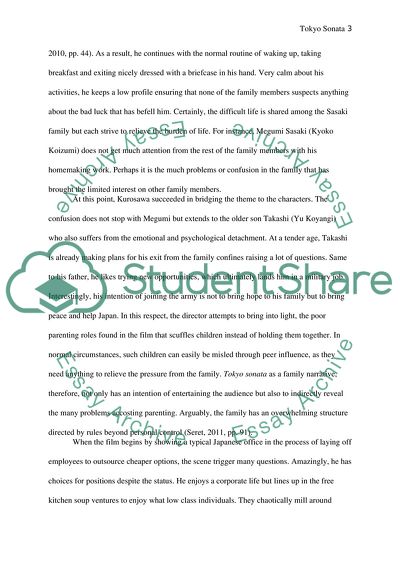Cite this document
(Tokyo Sonata by the Film Director Kurosawa Kiyoshi Movie Review, n.d.)
Tokyo Sonata by the Film Director Kurosawa Kiyoshi Movie Review. https://studentshare.org/visual-arts-film-studies/1838216-to-what-extent-can-tokyo-sonata-director-kurosawa-kiyoshi-2008-be-viewed-as-a-horror-film-andor-a-home-life-drama-discuss-the-representations-of-family-both-at-the-narrative-structure-and-visual-style-and-in-relation-to-the-films-genre
Tokyo Sonata by the Film Director Kurosawa Kiyoshi Movie Review. https://studentshare.org/visual-arts-film-studies/1838216-to-what-extent-can-tokyo-sonata-director-kurosawa-kiyoshi-2008-be-viewed-as-a-horror-film-andor-a-home-life-drama-discuss-the-representations-of-family-both-at-the-narrative-structure-and-visual-style-and-in-relation-to-the-films-genre
(Tokyo Sonata by the Film Director Kurosawa Kiyoshi Movie Review)
Tokyo Sonata by the Film Director Kurosawa Kiyoshi Movie Review. https://studentshare.org/visual-arts-film-studies/1838216-to-what-extent-can-tokyo-sonata-director-kurosawa-kiyoshi-2008-be-viewed-as-a-horror-film-andor-a-home-life-drama-discuss-the-representations-of-family-both-at-the-narrative-structure-and-visual-style-and-in-relation-to-the-films-genre.
Tokyo Sonata by the Film Director Kurosawa Kiyoshi Movie Review. https://studentshare.org/visual-arts-film-studies/1838216-to-what-extent-can-tokyo-sonata-director-kurosawa-kiyoshi-2008-be-viewed-as-a-horror-film-andor-a-home-life-drama-discuss-the-representations-of-family-both-at-the-narrative-structure-and-visual-style-and-in-relation-to-the-films-genre.
“Tokyo Sonata by the Film Director Kurosawa Kiyoshi Movie Review”. https://studentshare.org/visual-arts-film-studies/1838216-to-what-extent-can-tokyo-sonata-director-kurosawa-kiyoshi-2008-be-viewed-as-a-horror-film-andor-a-home-life-drama-discuss-the-representations-of-family-both-at-the-narrative-structure-and-visual-style-and-in-relation-to-the-films-genre.


